Lenovo ThinkServer RD640 review
Lenovo’s ThinkServer RD640 rack server doesn't have the feature set to beat alternatives from Dell and HP.
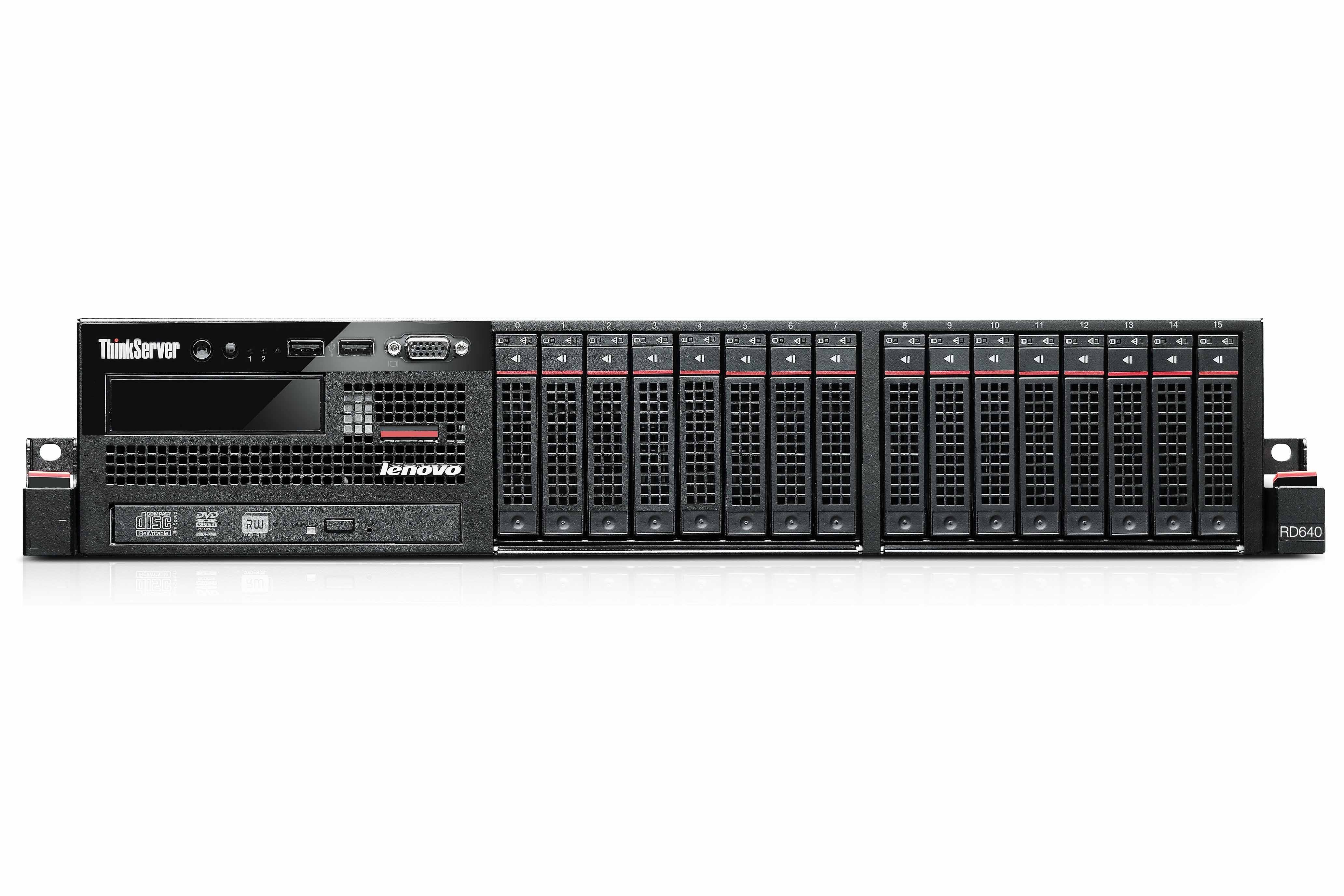
The ThinkServer RD640 is a well built 2U rack server. Storage capacity and RAID options are good but it’s beaten soundly by alternatives from Dell and HP when it comes to features and remote management capabilities.
-
+
Good value; High storage capacity; Well built
-
-
Basic remote management; Only 320GB of memory supported

Lenovo has switched focus for its ThinkServers to the enterprise. Aimed at big business applications such as virtualisation, databases and cloud services, the RD640 on review packs Intel's E5-2600 v2 Xeons and plenty of storage options.
The RD640 is direct competition to Dell's PowerEdge R720 and HP's ProLiant DL380p Gen8. Both these 2U rack servers took coveted IT Pro Editor's Choice awards for their blend of features so Lenovo needs something special to beat them.
The RD640 gets off to a good start in the storage department as it supports 8 LFF or 16 SFF hard disks. Both the standard DL380p and R720 servers support the same number although HP and Dell also offer special models with 25 or 26 SFF drive bays.
RAID options are reasonable with the base model coming with the ThinkServer RAID 500 II Adapter. This supports 6Gb/sec SAS and SATA drives plus stripes and mirrors and can be upgraded with an optional RAID-5 enabler key.
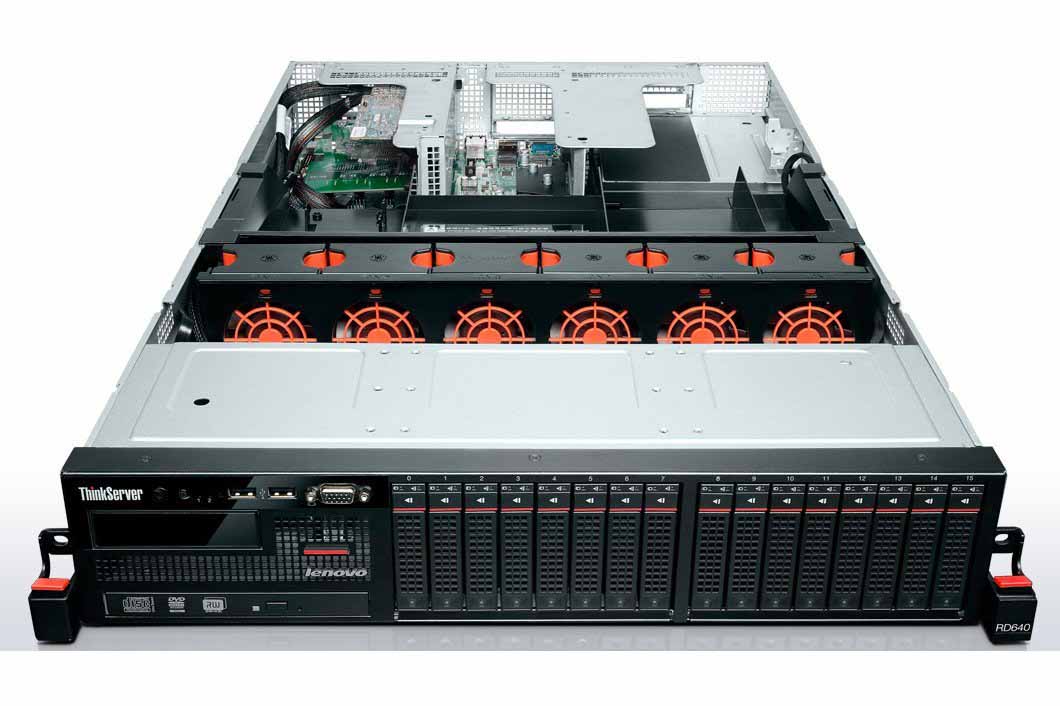
The RD640 has sixteen SFF drive bays while cooling is handled by a bank of six hot-swap fans
RAID and CacheCade
The price includes Lenovo's top-dog RAID 710 PCI-Express card with 1GB of battery protected cache and support for RAID-6. Options for this LSI based controller include a fast charging super capacitor and CacheCade technology for increasing IOPS.
Sign up today and you will receive a free copy of our Future Focus 2025 report - the leading guidance on AI, cybersecurity and other IT challenges as per 700+ senior executives
Using SSDs, the CacheCade feature can make a huge improvement to disk throughput. Dell's PowerEdge R720 also features this and in our exclusive review we found it gave IOPS a massive boost.
All 16 SFF bays in the review system are available as Lenovo has included an SAS expander card. The two ports on the RAID 710 card are cabled to this which, in turn, is linked by four more cables to the ports on the drive backplane.
Lenovo claims a 27 per cent increase in processing performance over the previous ThinkServer generation but this is down to the E5-2600 v2 Xeon processors. Intel designed these to deliver more cores and better performance for less power.
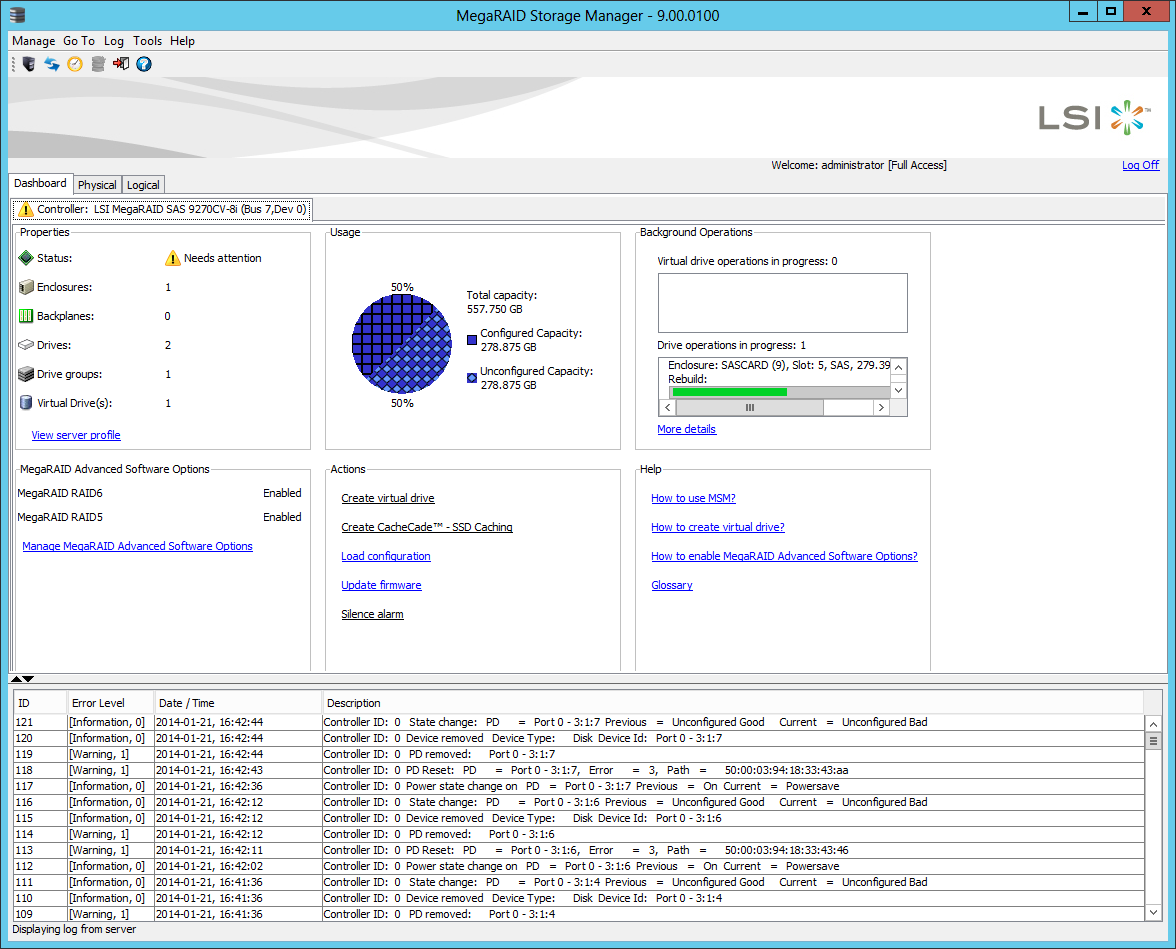
Lenovo's LSI based RAID controllers can be managed using the MegaRAID Storage Manager utility
Memory limitations
The server internals were tidy with cooling handled by a bank of six hot-plug fan modules across the front of the motherboard. Fan noise levels were higher than the DL380p and R720 which were silent.
Power options are limited as the RD640 supports two hot-plug 800W PSUs whereas Dell and HP offer three different models. Overall consumption was low with the review server pulling 105W in idle and 167W under extreme load.
Memory options aren't great. The motherboard has 20 DIMM slots and a lack of support for 32GB modules means the server maxes out at 320GB. Furthermore, if you choose low voltage DIMMs you can only fit up to 16 and the slots aren't equally distributed as the first CPU socket gets twelve and the second has eight.
The RD640 has dual embedded Gigabit ports whereas both the DL380p Gen8 and R720 sport quad Gigabit. Fortunately, there's room to expand as the server has a total of six PCI-Express slots with two occupied by the RAID and SAS expander cards.
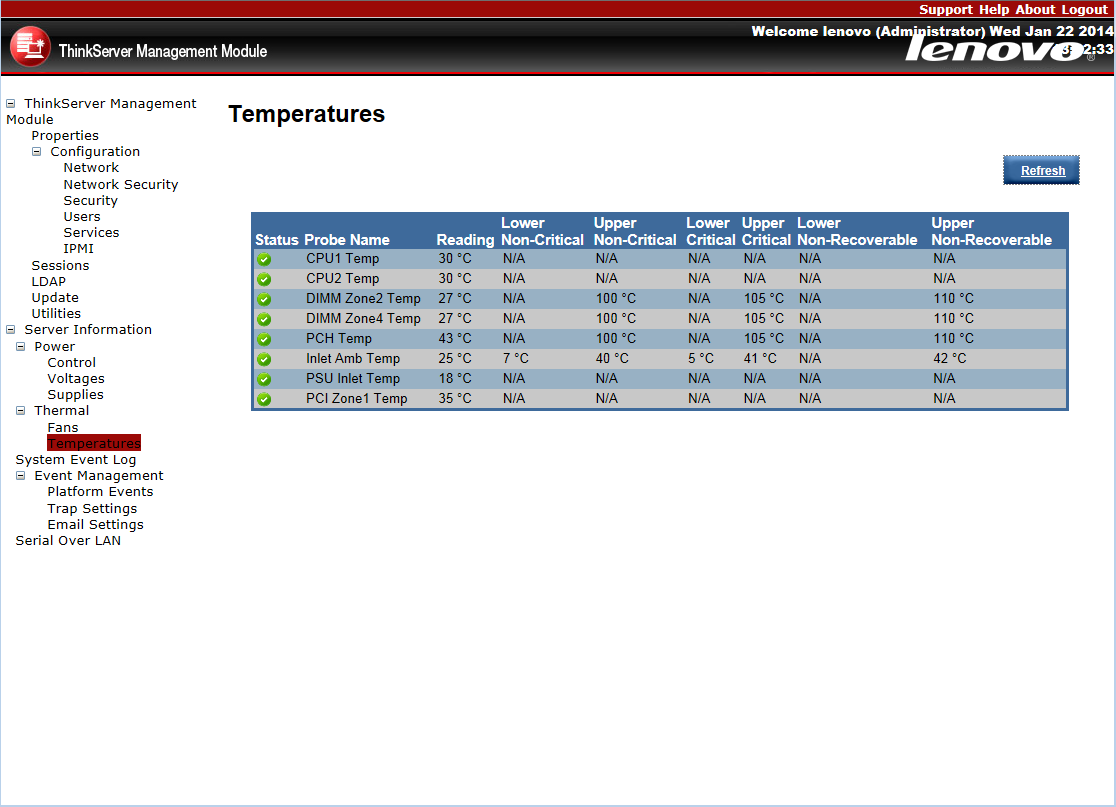
The ThinkServer's TMM provides only rudimentary remote management and monitoring tools
Installation and management
For virtualisation duties, the RD640 has a couple of internal USB ports that can be used to boot from an embedded hypervisor. However, the DL380p Gen8 has USB and SD card slots while Dell trumps everyone with its dual SD card controller which provides hypervisor redundancy.
To install an OS we needed to boot the server with its EasyStartup disc. It didn't take long to get Windows Server 2012 R2 loaded but Dell's embedded UEFI and HP's Smart Provisioning features are much slicker as they do away with the need for a boot disc.
For remote management, the RD640 has a dedicated network port linked to its embedded TMM (ThinkServer Management Module). Compared with Dell's iDRAC7 and HP's iLO4 it's woefully short on features but its basic web interface does provide access to power controls, sensor readings and remote control.
Lenovo also includes its ThinkServer EasyManage software which can monitor all your Windows servers using WMI. We found it simple enough to install and after running the discovery routine, we could use it to view system hardware and status, monitor performance and disk space and create reports.
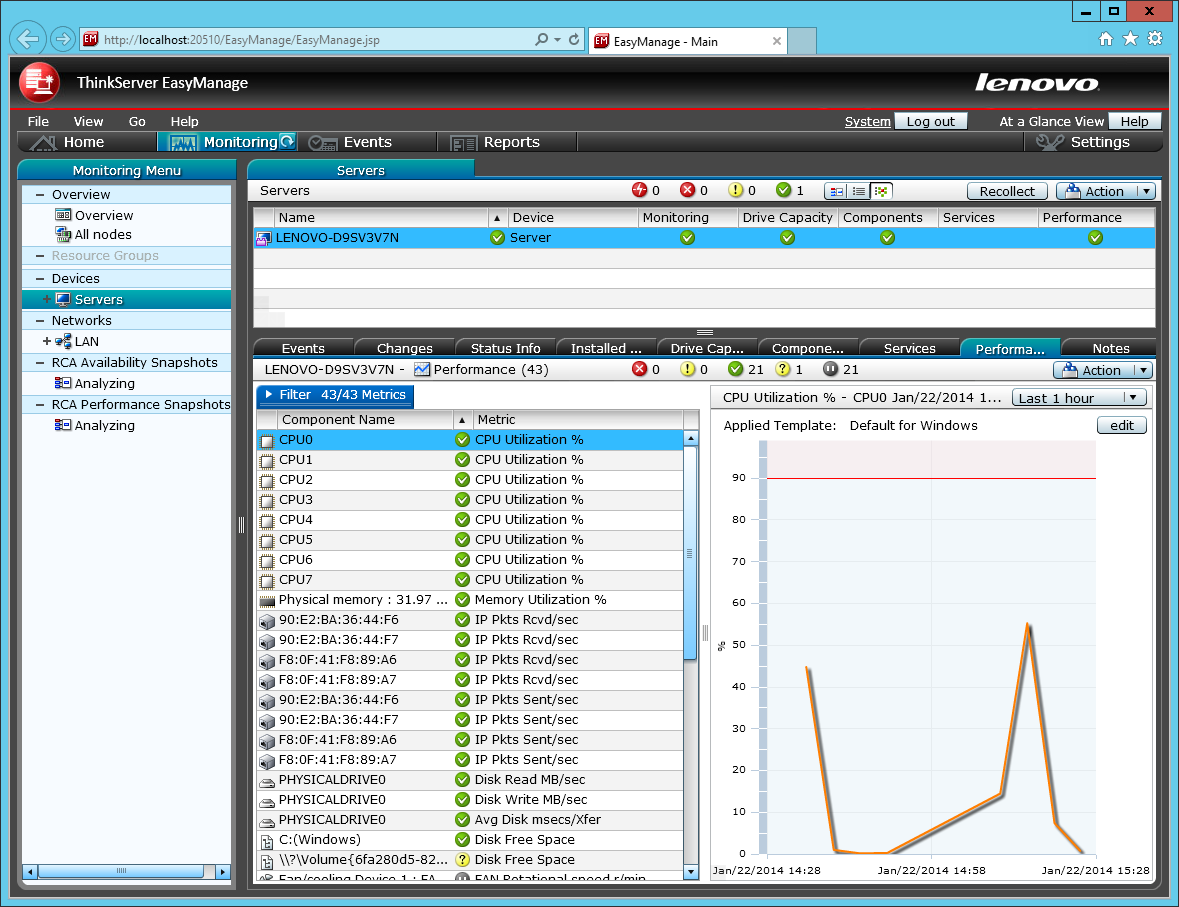
The ThinkServer EasyManage utility can be used to keep an eye on multiple servers from one console
Conclusion
With Lenovo quoting us an MRSP of 2,960 ex VAT for the review system, the ThinkServer RD640 is better value than similarly specified HP ProLiant DL380p Gen8 and Dell PowerEdge R720 servers. However, it simply can't match them for features whilst Lenovo's remote management facilities are basic.
Verdict
The ThinkServer RD640 is a well built 2U rack server. Storage capacity and RAID options are good but it’s beaten soundly by alternatives from Dell and HP when it comes to features and remote management capabilities.
Chassis: 2U rack
CPU: 2 x 2.5GHz Xeon E5-2609 v2
Memory: 32GB DDR3 (max 320GB)
Storage: 4 x 300GB Toshiba SAS 10K SFF hot-swap hard disks (max 16)
RAID: ThinkServer RAID 710 PCI-e card with 1GB cache/BBU
Other storage: ThinkServer SAS Expander card
Array support: RAID0, 1, 10, 5, 6, 50, 60
Expansion: 6 x PCI-e (4 free)
Network: 2 x Gigabit
Power: 2 x 800W hot-plug PSUs
Management: TMM with 10/100
Software: Lenovo EasyStartup and EasyManage
Warranty: 3yrs on site NBD
Dave is an IT consultant and freelance journalist specialising in hands-on reviews of computer networking products covering all market sectors from small businesses to enterprises. Founder of Binary Testing Ltd – the UK’s premier independent network testing laboratory - Dave has over 45 years of experience in the IT industry.
Dave has produced many thousands of in-depth business networking product reviews from his lab which have been reproduced globally. Writing for ITPro and its sister title, PC Pro, he covers all areas of business IT infrastructure, including servers, storage, network security, data protection, cloud, infrastructure and services.
-
 Agile development might be 25 years old, but it’s withstood the test of time – and there’s still more to come in the age of AI
Agile development might be 25 years old, but it’s withstood the test of time – and there’s still more to come in the age of AINews While Agile development practices are 25 years old, the longevity of the approach is testament to its impact – and it's once again in the spotlight in the age of generative AI.
By Ross Kelly Published
-
 European Commission clears Google’s Wiz acquisition, citing 'credible competition' from Amazon and Microsoft
European Commission clears Google’s Wiz acquisition, citing 'credible competition' from Amazon and MicrosoftNews Regulators said there are “several credible competitors” to Google regardless of the acquisition
By Ross Kelly Published
-
 EU inaugurates NanoIC facility for next-generation chips
EU inaugurates NanoIC facility for next-generation chipsNews The project forms part of efforts to reduce reliance on US and Asian supply chains
By Emma Woollacott Published
